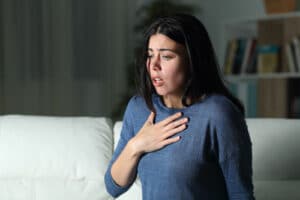Millions of people struggle with anxiety every single year. Many people experience a racing heart, sweaty palms, and knots in their stomachs. There are several reasons that may trigger anxiety in someone. In some diagnosed cases of anxiety, people may turn to other things to help them cope. One of these is drugs and alcohol, which can create a much worse situation.
Recovering from anxiety is something that is crucial to getting sober and clean. Anxiety disorders can be particularly brutal for many people. This can impact their life while causing negative repercussions like drug use and substance abuse. Both anxiety and drug addiction can feed off each other in a vicious cycle. Sometimes it can be tough to pinpoint which exactly comes first.
After treatment, sobriety and anxiety can be enemies in some situations. This is why it is crucial to get medical help for anxiety and drug addiction. Having a clear mind when you exit treatment is important for long term sobriety. In treatment, you can learn coping skills to reduce anxiety and increase the rate of long-term sobriety. Free by the Sea is ready to help you start your journey today.
A Closer Look at Generalized Anxiety Disorder (GAD)
Jump to Section
 It is estimated that around 40 million people (over the age of 18) suffer from anxiety disorders. This staggering number shows the severity and common space of anxiety disorder. What does it mean to have an anxiety disorder? It is completely normal to be nervous about a test or for a job interview. However, if these feelings persist and happen throughout the day, you may have a generalized anxiety disorder (GAD), panic disorder, or another phobia related disorder.
It is estimated that around 40 million people (over the age of 18) suffer from anxiety disorders. This staggering number shows the severity and common space of anxiety disorder. What does it mean to have an anxiety disorder? It is completely normal to be nervous about a test or for a job interview. However, if these feelings persist and happen throughout the day, you may have a generalized anxiety disorder (GAD), panic disorder, or another phobia related disorder.
People with generalized anxiety disorder will often be extremely nervous and worried almost every day. This can be a common occurrence that lasts for months or even years. A person may feel intense worry about school, personal life, common social interactions, work, and other daily occurrences. If you have excessive feelings of nervousness on a daily basis, you may have some form of GAD.
Signs and Symptoms of GAD and other Disorders
As with all mental disorders and addictions, there are a specific set of behaviors that can indicate a deeper problem. Be sure to look out for these in yourself or in loved ones. While a person may not exhibit every single one of these symptoms, it’s still important to get help. Symptoms of anxiety include:
- Irritability
- Muscle tension
- Restless behavior (or feeling ‘on-edge’)
- Troubles keeping attention and focus
- Fatigued and tired on a regular basis
- No control over worrying thoughts and feelings
- Insomnia, sleeping issues, or waking up without a sense of rest
While these symptoms can be very general, they can indicate a deeper issue. As mentioned, there are other types of anxiety disorders. Panic disorders are characterized by sudden moments/periods of acute and intense fear. Certain ‘triggers’ can result in a panic attack, sometimes a panic attack may occur for no reason at all. People who struggle with panic disorders will most likely avoid situations or certain people to avoid panic attacks.
Phobia-related disorders are more specific to a person and are characterized by an intense fear of a certain thing or idea. A person will try to avoid this at all costs. People may be afraid of spiders, blood, snakes, heights, and other specific things.
Self-Medicating with Alcohol and Drugs
Anxiety disorders have the potential to negatively impact a person’s life in and out. It is no surprise that those struggling with GAD may turn to alcohol or drugs to cope. Alcohol in particular is easily accessible and can be seen as a way out for some people. However, alcohol usually ends up creating other worse issues like alcoholism and dependency.
In certain situations, alcohol abuse and drug addiction can actually mask underlying mental health conditions. Anxiety is just one of many disorders that can be lost between the cracks of addiction (eating disorders, traumas, mood disorders, and others). This can indicate a worse situation in the form of a co-occurring disorder. This can happen when a person is recovering from anxiety.
Co-occurring disorders occur when a person is addicted to a substance or alcohol while struggling with a mental health disorder (like GAD). These situations can be very intense and can cause a number of negative problems, physically and mentally. What tends to happen is that both disorders begin to feed off each other. Thus, an endless and destructive cycle of using drugs to cope is created. It is a fact that alcohol and drugs only worsen the mental state of a person.
Treating Co-Occurring Disorders (Anxiety and Addiction)
In cases of co-occurring disorders (also called dual diagnosis), intensive treatment is usually necessary. Rehab centers like Free by the Sea are able to treat both addiction and mental health disorders (in this case, recovering from anxiety) separately. With care and patience, a person is able to come to terms with both of these interwoven problems. It can be a hard journey at times but it is necessary to live a better and healthier life without pain and addiction.
Recovering from anxiety and drug addiction is the first step towards a better future. Typically, different types of therapy are used to treat co-occurring disorders. By finding the root of a person’s addiction and allowing coping skills to reduce anxiety, a person can effectively recover.
Tips for Sobriety and Anxiety Control
 After a person gets treatment, their journey doesn’t just end. While they may be in a better state of mind and free of addiction, it’s important to stay in this frame of mind. Life may have stresses and situations that can be tough. Anxiety and drug cravings can begin to emerge if you don’t have the right tools. This is why it’s important to have some techniques for dealing with anxiety during and after recovery.
After a person gets treatment, their journey doesn’t just end. While they may be in a better state of mind and free of addiction, it’s important to stay in this frame of mind. Life may have stresses and situations that can be tough. Anxiety and drug cravings can begin to emerge if you don’t have the right tools. This is why it’s important to have some techniques for dealing with anxiety during and after recovery.
Let’s take a look at some useful tips after recovering from anxiety and addiction. Staying sober can be a tall task but with the right state of mind and positive techniques you can remain in control.
Practicing Meditation
Meditation is used for both addiction treatment and mental health disorders like anxiety. It can help a person achieve a feeling of relaxation, happiness, and clarity in their life. There are many different styles of meditation that can help those who are recovering from anxiety. Each can be used to maintain a level head and balance in life. Guided meditation, transcendental meditation, and yoga medication are just a few of the many different types. Meditation is definitely something to check out if you or a loved one is dealing with anxiety after treatment.
Talk to Someone
Similar to therapy, it is very useful to talk to someone about your worries and feelings. Feelings of anxiety can occur at any moment. However, just talking to someone, whether a friend or a professional, can be therapeutic and beneficial. It doesn’t matter if it feels like a silly or trivial matter, don’t be afraid to open up about feelings and talk with someone about them. This makes those small and pesky feelings of anxiety more manageable and clear.
Change up Your Diet
Believe it or not but the food you eat and the things you drink can have a big impact on your body. Not only do certain foods and diets affect your body but your mind as well. Anxiety can be worsened if you drink too much caffeine, too many sweets, fatty and processed foods, and of course, alcohol. If you want to take control of your anxiety, it is recommended you stick to healthier foods. Whole grains, fish, fruits, and plenty of water can help you stay level headed and healthy.
Stay Creative and Active
There are a number of healthy distractions for your anxiety. Many people have hobbies or activities that keep them occupied while staying creative. Both your sobriety and anxiety can be kept balanced by listening to music, writing, reading, creating art, and getting some exercise. Exercise is a great way to stay healthy and has been proven to help with anxiety. While it is not recommended to just ignore the telling signs of anxiety, staying busy can be very beneficial.
Try Yoga
Yoga is a relaxing and commonly used technique for healing and staying calm. Yoga can be a powerful tool for recovering from anxiety and dealing with it when it appears. There are many kinds of yoga, one of which is for 12-Step Recovery. This intertwines the 12-step principles with quality yoga practice. Moving your body and staying relaxed can be a great release for your anxiety.
The Importance of Getting Help
Dealing with anxiety and sobriety can be a stressful situation at times but knowing how to stay in control can be the key to long-term recovery. Before you can cope with your anxiety back at home, you must take the first step towards getting help. Both alcohol addiction and anxiety can be crippling situations. Over time they can really begin to fester into a tough situation.
Turning towards professional help from our staff at Free by the Sea may be the best way to reach a brighter future. We offer a number of effective and trusted treatment options for addiction and mental health. If you or a loved one is struggling with co-occurring disorders (or an addiction), let us help you. Contact us today to learn more about our treatment options today.

Dr. Richard Crabbe joined our team in 2019 as our psychiatrist and medical director. He attended the University of Ghana Medical School where he became a Medical Doctor in 1977. From 1978 through 1984, he was a medical officer in the Ghana Navy and provided a variety of services from general medicine to surgeries. He received his Certificate in General Psychology from the American Board of Psychology and Neurology in 2002.

 December 21st, 2020
December 21st, 2020










